Ata-ul-Haye Nasir, Ahmadiyya Archive & Research Centre
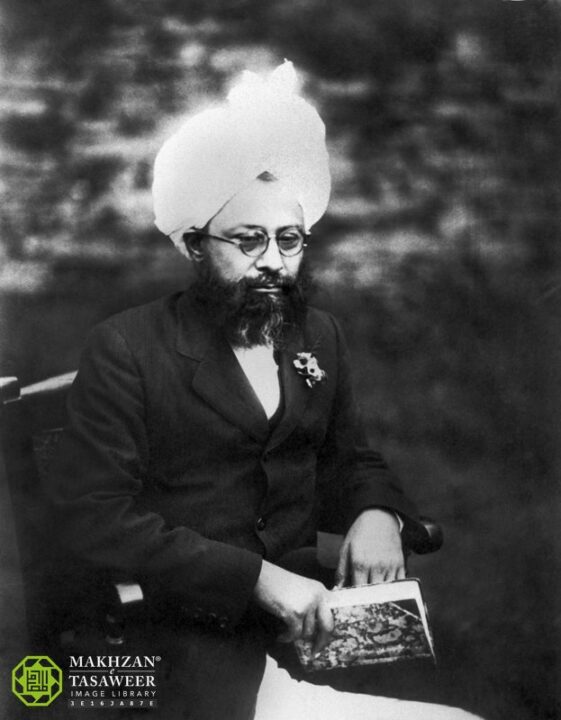
Background
Under the Montagu-Chelmsford Reform Scheme of 1918, the British government had decided that after ten years, a commission would be sent to India to examine the effects and operations of the constitutional reforms and to suggest more reforms for India.
On 8 November 1927, an announcement was made by the British government that the Indian Statutory Commission (also known as Simon Commission) will be sent to India under the presidentship of Sir John Allsebrook Simon. This aroused a huge controversy and various sections of India decided to boycott the Commission, since it did not include even a single Indian. Even some prominent Muslim leaders like Jinnah supported this boycott.
Upon this, Hazrat Musleh-e-Maud, Mirza Bashiruddin Mahmud Ahmadra advised the Muslims that the boycott would be more detrimental for Muslims, compared to the Hindus. Anyhow, the Simon Commission arrived and began its work in 1928.
The details of the Simon Commission and Huzoor’sra guidance to the Indians in general and Muslims, in particular, have already been mentioned in an article, titled “The Simon Commission, First Round Table Conference and Hazrat Musleh-e-Maud’sra valuable guidance” (Al Hakam, 26 November 2021, Issue 193, pp. 16-17).
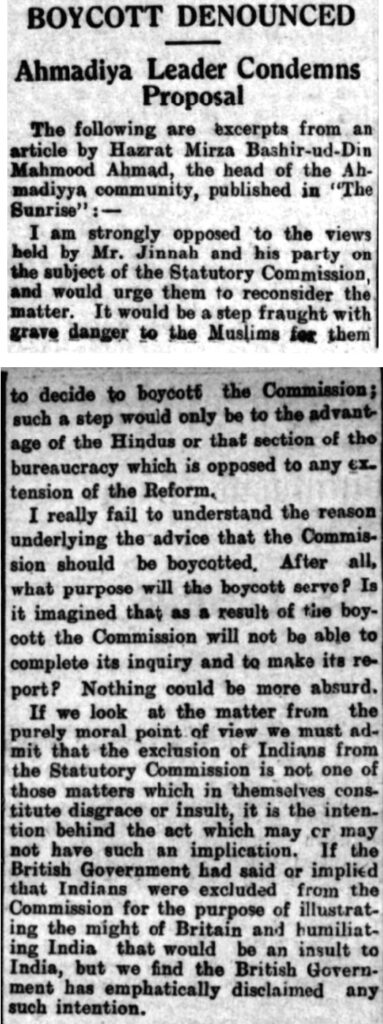
When the Viceroy of India put forward a suggestion of a Round Table Conference in London, to resolve the problems, the then Governor of the United Provinces Sir Malcolm Hailey advised him that any conference would have to be advisory and not authoritative. Moreover, John Simon also disputed the proposed conference, asserting it would undermine his report. Later on, after thorough discussions, John Simon agreed to the idea of holding the Conference. The Viceroy of India also made clear that the solution for India’s political problems would heavily rely on the Simon Commission’s report. (“Conferencing the International”, www.nottingham.ac.uk)
On the other hand, the Indian National Congress passed a resolution on 31 December 1928, giving the deadline of 31 December 1929 for the British government to commit to Dominion Status, or face a movement of civil disobedience. (Habib, Irfan. “Civil Disobedience 1930-31.” Social Scientist 25, no. 9/10 (1997): 43–66. https://doi.org/10.2307/3517680.)
On 5 June 1929, Ramsay MacDonald had his first meeting as the British Prime Minister, with King George V. The new Labour government was a source of great encouragement for the Indians, due to the fact that on 2 July 1928, Ramsay MacDonald had said at the British Commonwealth Labour Conference in London:
“I hope that within a period of months rather than years, there may be a new Dominion added to the Commonwealth of our nations; a Dominion of another race, a Dominion that will find self-respect as an equal within this Commonwealth. I refer to India.” (Jinnah: Creator of Pakistan, Hector Bolitho, London, 1954, pp. 96-97)
The Viceroy of India drafted a proposal for a declaration that the intention of the British Government was to confer Dominion Status for India eventually and that after the completion of the Simon Commission’s report, a Round Table conference of Indian leaders would be held in Britain.
On 16 October 1929, Sir John Simon, head of the Simon Commission, also suggested to British Prime Minister Ramsay MacDonald:
“It seems to us that what would be required would be the setting up of some sort of conference […] [in which] His Majesty’s Government would meet both representatives of British India and representatives of the States […] for the purpose of seeking the greatest measure of agreement for the final proposals which it would later be the duty of His Majesty’s Government to submit to Parliament.” (Ibid, p. 97)
On 31 October 1929, the Viceroy of India made a declaration, agreeing to a Round Table Conference of representatives of the British government and Indian parties. (Habib, Irfan. “Civil Disobedience 1930-31.” Social Scientist 25, no. 9/10 (1997): 43–66. https://doi.org/10.2307/3517680.)
On 23 December 1929, various Indian leaders including Gandhi, Motilal Nehru and Jinnah met with the Viceroy and put before him certain demands on behalf of the Indians. The Viceroy refused to offer anything beyond his own declaration about the Round Table Conference. Hence, it became apparent that the deadline of 31 December 1929, given by Congress a year ago, for the government to commit to the Dominion Status of India, would pass without any satisfactory agreement to break the ice. (Ibid)
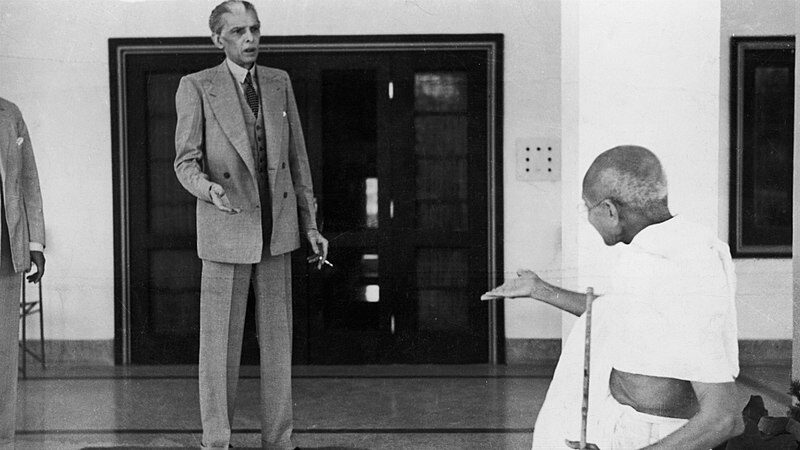
Civil Disobedience in British India
The writing on the wall suggested that Congress was in no mood to partake in any further negotiations. The political atmosphere in British India continued to worsen due to the lack of a satisfactory agreement between the government and political parties, and thus, on 6 April 1930, the Indian National Congress initiated civil disobedience. Though some Muslim organisations such as Majlis-e-Ahrar and Jamiat-ul-Ulema favoured this initiation, the Muslims as a whole, refrained from this movement.
Hazrat Musleh-e-Maud’sra guidance and efforts for peace
The efforts of Hazrat Musleh-e-Maud, Mirza Bashiruddin Mahmud Ahmadra played a huge role in preventing the Muslims of India, as a community, from indulging in such chaos. In his Friday Sermon on 2 May 1930, Huzoorra spoke about the ongoing situation and advised the Indian leaders to follow peaceful and constitutional means to achieve their objectives and to refrain from any kind of violence or chaos. Huzoorra categorically declared:
“We are also desirous of the freedom and independence of India, as are Gandhi Ji, Pandit Motilal Nehru, Pandit Jawaharlal Nehru, Mr Sen, Mr Iyengar, Dr Stya Paul, etc. Moreover, India is our country, as it belongs to them, and our hearts are passionate with the love for the country and freedom of speech, just like their hearts. Therefore, we can never accept the notion that we have no love for India in our hearts, or that others should be considered more passionate than us in this regard.” (Khutbat-e-Mahmud, Vol. 12, pp. 380-381)
Huzoorra continued by saying that on one hand the Islamic teachings and worldly principles suggest that it is unlawful to rebel against an established government, and on the other hand, “the feelings of patriotism, the educational and economic needs of the country, and human dignity and honour are compelling one to strive for the country’s freedom. […] To find a way in between these two aspects is a very delicate matter, but no doubt, this is the correct pathway.” However, Huzoorra said, the people of India are not following this pathway and indulging in such acts which have neither proved beneficial in the past nor will they be fruitful now:
“Freedom is a very good [demand] in itself, however, while achieving this, the application of such a method which may potentially enslave [a nation] forever, can never be correct.” (Ibid, p. 383)
Huzoorra continued by saying that disrespecting the law of the land in an attempt to achieve freedom is an act which would enslave India forever. (Ibid)
Huzoor’sra letter to the Viceroy
The atmosphere within the country was continuously worsening, the government began to arrest people, and the movement of civil disobedience began to spread all over the country. In light of such a situation, Hazrat Musleh-e-Maudra wrote a letter to the then Viceroy of India, Lord Irwin, on 2 May 1930. Huzoorra presented the following proposals in relation to the establishment of peace and harmony within the country:
A conference should be called to consult with the representatives of all those parties of the country who desire peace and justice, as to find a way to ensure that the law of the land is respected and there are no complaints from the Indians about the use of violence against them by the government. A conference should be called of all the governors, and a unanimous pathway needs to be proposed for the whole of India. The regulatory laws about the Press are essential to a certain extent, however, the demand for high amounts of security bonds is unbearable for the Urdu Press and will intensify the chaos. Therefore, they should be cautioned at first, then a small amount of security bond can be demanded, and then if the issue is not resolved, the amount of security bond can be increased. The government should announce that the ongoing arrests are not to hinder the Freedom Movement, but rather, to foster a suitable atmosphere for that objective and that the Dominion Status will surely be granted to India. The Muslims, as a community, have remained aloof from the current disorder, however, during the chaos in Peshawar – which took place on 23 April 1930 when two Congress leaders from the NWFP were arrested – the government made a huge mistake and the local authorities did not show restraint. The government should compensate for its mistake. In this regard, an announcement will be beneficial that the NWFP will also be granted reforms on the same scale as the other provinces of the country. The Muslims are suspicious that the government will suppress their rights under the influence of the majority Hindus, and thus, this issue must be settled. (Tarikh-e-Ahmadiyyat, Vol. 5, pp. 194-195)
The Times of India reported:
“CONFERENCE OF SUPPORTERS OF PEACEFUL PROGRESS.
“A Suggestion to the Viceroy.
“Muslim Fear Lest the Govt. Should Yield to Hindu Agitators.
“A suggestion that the Viceroy should call a conference of leaders who believe in peaceful progress was made by the head of the Ahmadiyya community in a letter explaining the Muslim attitude towards the present political situation.
“The letter voices the suspicion prevalent among Muslims that in the final settlement of India’s future constitution, the Government might yield to Hindu agitators, ignoring the claims of the Muslims.
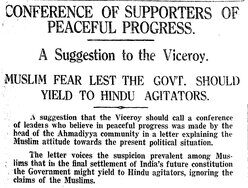
“His Excellency, in his reply, […] observes that the ‘time may come when some form of formal conference of those who desire the peaceful progress of the country may be considered desirable.’ He also announces consulting local governments regarding the Sarda Act.
“The suspicion among the Muslims that in the final settlement of the future constitution of India, the Government will yield to the Hindu agitators and fail to concede to Muslims their due rights was one of the factors that prompted His Holiness Hazrat Mirza Bashir-ud-Din Ahmed, Head of the Ahmadiyya community, to address a long letter to His Excellency the Viceroy offering a few suggestions with regard to the present political situation in India. In sending to us copies of his letter and the Viceroy’s reply to it, the Foreign Secretary of the Ahmadiyya community observes that His Excellency’s reply proves that the attitude of the Government is not as unreasonable as it is generally believed to be and that, while holding its prestige, the Government is prepared to give sympathetic consideration to any reasonable proposals that may come from any quarter.
“His Holiness, in the course of his letter, expresses the opinion that the desire for freedom among Indians is widespread and that the strength of the movement cannot be ignored. He assures His Excellency that the members of the Ahmadiyya community are staunch supporters of the idea of freedom for India within the Empire on the one hand and that they regard respect for, and obedience to the law of the land as part and parcel of their religion. He offers the community’s assistance to the Government in all just and rightful measures to fight the campaign of civil disobedience and suggests, in that connection, that a conference should be held to which representatives should be invited of all such communities and classes as are desirous for peaceful progress. His Excellency should preside over this conference and ask for their views on the measures that should be adopted to reestablish respect for law and to maintain peace and order without giving the people ground for suspecting that the Government is resorting to a policy of repression.
“A UNIFORM POLICY.
“A conference of the Governors and administrative heads of the various provinces should also be convened and, in consultation with them, the Viceroy should settle a uniform policy for the whole of India. He invites His Excellency to make it clear that the arrests which are being made at present are not intended to check the movement for freedom, but are meant to produce a better atmosphere for the same and that the Government will remain true to their oft-repeated declaration concerning the grant of Dominion Status to India.
“Although the Muslims have, as a community, remained aloof from the present agitation, His Holiness proceeds, the Government has made a mistake in regard to the disturbances of Peshawar in which Muslims have greatly suffered. He alleges that the local officials did not exercise adequate restraint and suggests that the Government should adopt a policy of conciliation towards Muslims and considers it desirable that the Government should issue a statement declaring that in the future constitution of India, the North-West Frontier Provinces would be granted reforms on the same scale as other provinces.
“CONTROL OF THE PRESS.
“While agreeing that a stricter control of the press in India is desirable, His Holiness thinks that to demand heavy securities from Indian newspapers would only serve to augment unrest and agitation. If the papers close down in consequence, people would receive no news of the happening in different parts of the country and baseless rumours will in consequence go around, giving rise to a feeling that revolts and uprisings occur all over the country. His Holiness suggests that in the first instance offending newspapers must be warned and that subsequently light securities should be demanded of them.” (The Times of India, 5 June 1930, p. 10)
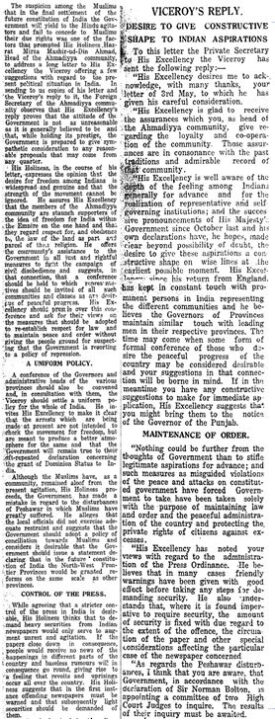
Viceroy’s reply
In response to Hazrat Musleh-e-Maud’sra letter, a reply was received from the Private Secretary to the Viceroy. The Times of India wrote:
“VICEROY’S REPLY.
“DESIRE TO GIVE CONSTRUCTIVE SHAPE TO INDIAN ASPIRATIONS
“To this letter, the Private Secretary to His Excellency the Viceroy has sent the following reply:
“‘His Excellency desires me to acknowledge, with many thanks, your letter of 3rd May, to which he has given his careful consideration.
“‘His Excellency is glad to receive the assurances which you, as head of the Ahmadiyya community, give regarding the loyalty and cooperation of the community. Those assurances are in consonance with the past traditions and admirable record of that community.
“‘His Excellency is well aware of the depth of the feeling among Indians generally for advance and for the realization of representative and self-governing institutions; and the successive pronouncements of His Majesty’s Government since October last and his own declarations have, he hopes, made clear beyond possibility of doubt, the desire to give these aspirations a constructive shape on wise lines at the earliest possible moment. His Excellency since his return from England has kept in constant touch with prominent persons in India representing the different communities and he believes the Governors of Provinces maintain similar touch with leading men in their respective provinces. The time may come when some form of formal conference of those who desire the peaceful progress of the country may be considered desirable and your suggestions in that connection will be borne in mind. If in the meantime you have any constructive suggestions to make for immediate application, His Excellency suggests that you might bring them to the notice of the Governor of the Punjab.
“‘MAINTENANCE OF ORDER.
“Nothing could be further from the thoughts of Government than to stifle legitimate aspirations for advance; and such measures as misguided violations of the peace and attacks on constituted government have forced Government to take, have been taken solely with the purpose of maintaining law and order and the peaceful administration of the country and protecting the private rights of citizens against excesses.
“‘His Excellency has noted your views with regard to the administration of the Press Ordinance. He believes that in many cases friendly warnings have been given with good effect before taking any steps for demanding security. He also understands that, where it is found imperative to require security, the amount of security is fixed with due regard to the extent of the offence, the circulation of the paper and other special considerations affecting the particular case of the newspaper concerned.
“‘As regards the Peshawar disturbances, I think that you are aware that [the] Government, in accordance with the declaration of Sir [Horatio] Norman Bolton, is appointing a committee of two High Court Judges to inquire. The results of their inquiry must be awaited.” (Ibid.)
The newspaper continued:
“CONFERENCE PROBABLE.
“The Foreign Secretary of the Ahmadiyya community, drawing attention to important points in His Excellency’s reply, considers that, although the Viceroy may not at present be prepared to convene a conference of selected leaders of the people to discuss with them the ways and means for creating a better atmosphere and for combating the spirit of defiance of law and authority, one can easily find, reading between the lines, that His Excellency does not consider the holding of such a conference quite improbable and that it is possible that an opportunity to bring this about may present itself any moment. The Head of the Ahmadiyya community is already corresponding with responsible leaders on this weighty question and he intends again to address His Excellency about it. […]
“APPEAL TO MUSLIMS
“The Foreign Secretary earnestly appeals to all sane and level-headed Indians and his co-religionists, in particular, to abstain from participating in movements that are at once demoralising and subversive of the established order and to secure an equitable settlement of their rights by legitimate and constitutional means. He continues:- ‘A wise and united nation can never be kept, indefinitely deprived of its just rights. And a person who thinks that a country with an enormous population like India will not succeed in getting its deserved rights unless it resorts to unconstitutional and illegitimate means and unless its elders, by banishing from the minds of the coming generation all respect for law and constituted authority, make them wholly irresponsible and unprincipled, not only disgraces his nation and country but disgraces humanity itself. We should exercise our brains to find out the solution to the knotty problems that confront us and scrupulously avoid all those methods which may lend temporary strength to our cause, but would eventually give a death blow to our moral existence. Such methods, by rendering impossible the establishment of any kind of Government, foreign or indigenous, instead of helping it to rise to the highest principles of political progress and development, would only bring chaos and anarchy for centuries to come. In pursuance of the directions of the Ahmadiyya community, I declare on its behalf that we are as loyal to our country and as solicitous of its progress and prosperity as other people are and that we are quite prepared to make all sorts of legitimate sacrifices and lawful and constitutional efforts to secure for our beloved country true and real independence; but at the same point I should fervently appeal to my countrymen to steer clear of all movements that bring nothing but ruin and disaster in their wake.” (Ibid.)
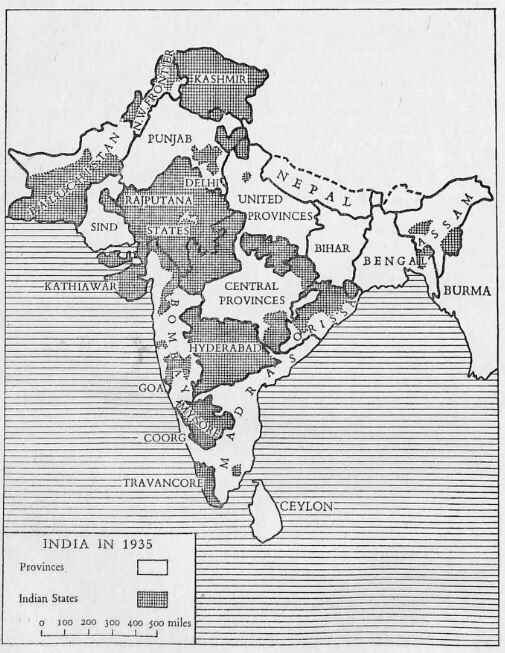
Huzoor’sra response to an objection
It is important to mention here that in those days many would object that why a religious community like Jamaat-e-Ahmadiyya interferes in political matters. Responding to such objections, during his Friday Sermon on 30 May 1930, Hazrat Musleh-e-Maudra said:
“For those who object that why we interfere in political matters, I have three responses:
“Firstly, we were occupied in our [religious] work, however, you disturbed and troubled us and repeatedly objected, ‘Why are you silent [on the country’s situation]’, therefore, we were compelled to express the opinion which we deem to be correct.
“Secondly, our Jamaat is present, by the grace of God Almighty, in all parts of India and foreign countries as well, and many of those members do not get the opportunity to visit Qadian for years. Therefore, to give them guidance and suitable direction, it is essential for us to express our views in relation to the country’s situation through our own press and the other [non-Ahmadi] press as well.
“Thirdly, we are preachers, and our duty is to propagate whatever we consider to be true. […]
“If our views are incorrect, there is no reason for our opponents to worry about them, since people would themselves reject once they hear [those views]. However, we cannot be deprived of our right to propagate our views just like they [opponents] are doing. […] The Promised Messiahas urged his opponents to organise such jalsas in which people may narrate the distinctive features of their respective religions. He did not say that ‘Since I have been appointed by God Almighty, thus, all other people should shun the preaching of their Faith.’ […] He did not do so, because he knew that other people also have the right to preach [their respective Faith] just like him.” (Khutbat-e-Mahmud, Vol. 12, pp. 417-418)

